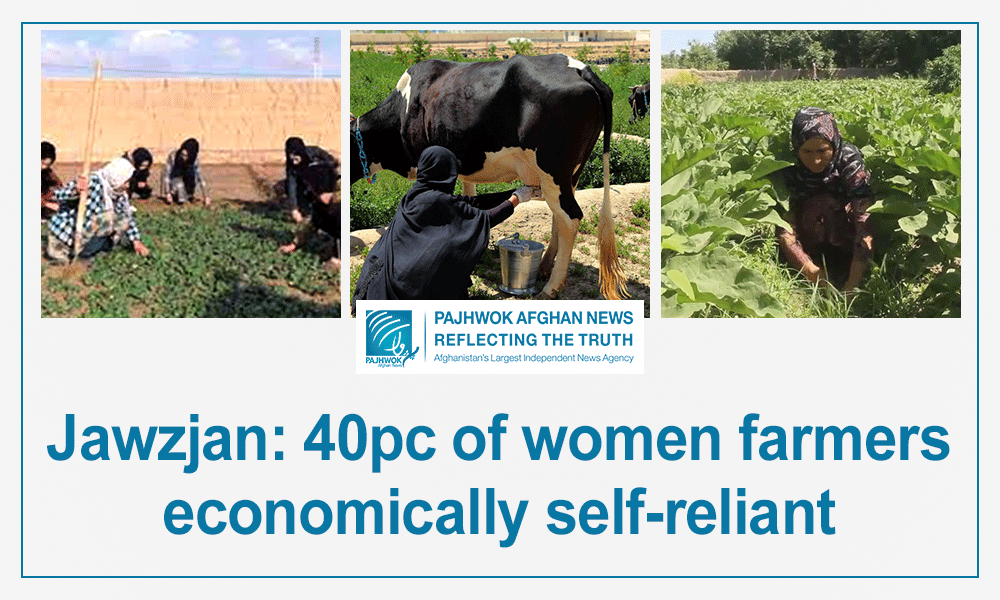SHIBERGAHN (Pajhwok): Women farmers and livestock owners in northern Jawzjan province, who earn money by growing vegetables and making dairy products, are calling on the government to support their business.
Over the past two decades, dozens of agricultural support programs and training programs have been implemented for women, and thousands of women in various provinces have become self-sufficient by establishing home gardens.
Jawzjan agriculture department says that about 2,000 women are engaged in livestock and agriculture activities in the province.
Sabera, a 30 years old resident of Shiberghan, capital of Jawzjan, economically supports her family of seven by growing and selling agricultural products.
Suffering from various problems, she looks older than her age and is still struggling with many challenges.
While preparing for the coming spring, Sabera told Pajhwok Afghan News that she has been working in agriculture since last 10 years and making a living for her family.
Unmarried, the woman feels proud that she has been able to work for her family like men and play a great role in her family’s economy.
“Before we started growing vegetables, we were in a bad situation, and with the help of a friend, I attended women’s training programs at the agriculture department where I learnt a lot of things,” she said.
She said that after completing the training, she decided to grow vegetables on a piece of land she owned.
“We have a piece of land behind our house and I turned part of it into a home garden with the help of my two sisters and a brother, we grow vegetables like spinach, onion, coriander, tomatoes, cucumber and eggplant, we had some difficulties in the beginning but when I offered the corps to the market, I was happy and encouraged,” she said.
Sabera said that during the cultivation of vegetables, she was in contact with Department of Agriculture officials and used their advice to improve her farms.
A graduate of high school, she said, “Economic problems did not let me study at university, and I had to turn to agriculture to help my brother, who lives with us, I am satisfied with my work and my brother is helping me in selling crops.”
She called on the government to support women farmers and distribute chemical fertilizers to them, increase training programs and find market for their products.
Besides Sabera, there are other women in Shiberghan who work in other areas and earn for their families.
Ziagul is a woman whose family is without a caretaker. She ekes out a living by selling dairy products.
“I support my family of six, because I lost my husband fifteen years ago, he had cancer,” she said.
She said, “I could not afford to buy cows and prepare dairy products from natural milk. I contacted families who had cows, goats and sheep. I buy milk and yogurt from them every day and sell them in the market.”
She said that when her husband died, her children were small and she raised them with many difficulties and sent them to school.
“I am fifty-five years old, I have four daughters and two sons, my sons have graduated from schools and one of them is married,” she said.
The women said she was making good amount of money from her work and asked the government to support all women workers.
Abdul Sattar Jalal, in charge of plans and programs at Jawzjan agriculture department, said that agricultural support programs for poor women and livestock owners started 12 years ago in Shiberghan city.
He said that in the beginning, 200 women started their work creating home gardens in Shiberghan city.
“When we got positive result from the work of women in the horticulture sector, we also started a vegetable growing program for a number of women from poor families,” he said.
Jalal said that most of the vegetables sold in the city’s markets today are the product of women farmers.
He added that agricultural training programs for promoting agricultural activities for rural women continued and some families have reached economic self-sufficiency with the help of the programs.
Around 2,000 women are engaged in livestock and agriculture activities in Aqcha and Khwaja Dukoh districts and Shiberghan city, he said.
According to Jawzjan agriculture department, women farmers mainly engaged in cultivation of emerald, spinach, tomatoes, eggplant, coriander, wheat, cocoon, horticulture and livestock.
At least forty percent of these women are economically self-sufficient.
mds/ma
Views: 227
